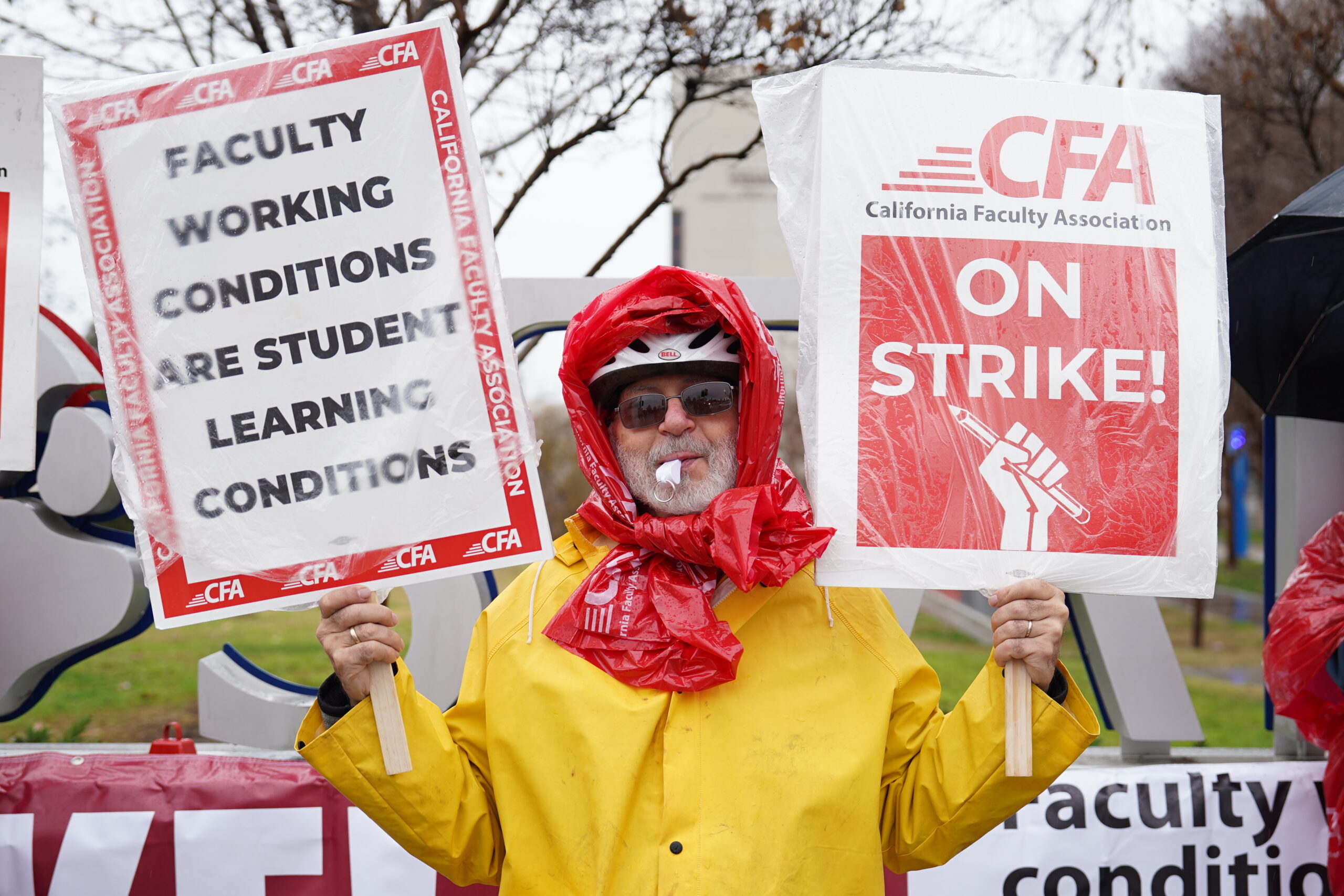New America Media, Q&A, commentaries, Carolyn Goossen and writers from The Know
Editor’s Note: The $4.8 billion proposed budget cut targeting K-12 and community colleges could further cramp access to community college for thousands of students. NAM education editor Carolyn Goossen spoke with Abdi Soltani, executive director of Campaign for College Opportunity who has been advocating for legislation to help low-income students in middle school plan for college, and offer them community college fee waivers. Also, four high school writers with Fresno-based youth magazine The Know write about the importance of community college to them.
What do the proposed budget cuts mean for California community colleges?
The governor has proposed a 10 percent cut across the board, including K-12 public education and community college. For community colleges, the cuts will mean a net loss of 50,000 students. (In the California State University system (CSU), it’s 10,000 students, and in the University of California (UC) it’s 5000 students.) It will also mean a reduction in course selections and counselors, leading to a longer time to obtain a degree, and fewer services for students. All of this said, parents and prospective students should not be discouraged. The figure of 50,000 fewer spots in community college is out of 2 million students total. There is still plenty of opportunity, plenty of access.
When will the proposal cuts start having an impact on community colleges?
If the cuts are implemented, they will affect enrollment for the 2008-09 school year. These cuts will lower the base from which future budgets are developed. And if the budget crisis persists, things could get even worse. But right now, these are only proposed cuts. In May, the governor will put forward a revised proposal, and in June, the legislature needs to adopt the budget. This puts community colleges in a difficult place for planning next year. They don’t know if they should act based on the proposed cuts.
Is there a chance the cuts won’t be passed by the legislature?
The legislature and the governor have to negotiate on the budget. That includes Democrats and Republicans in the Assembly and the Senate. Republicans in the legislature tend to oppose any tax increases, while Democrats tend to favor them as one way to close the budget gap. One way or another, they will all agree on a budget, the question will be how deep the cuts will be and whether any new taxes are considered.
How will financial aid programs be affected?
The governor’s budget will keep some students out of the competitive Cal Grant B program—one of the biggest state financial aid programs. The Cal Grant has two parts—an “entitlement” part for recent high school graduates, and a “competitive” part, which tends to be for older students. Some 43,000 community college students get one of these competitive grants right now. One of the things the governor has proposed is that no new students will be eligible for the competitive CalGrant B. This could affect several thousand students.
How are community colleges affected differently from the CSU and UC system?
The governor entered a compact with state universities systems several years ago, basically, a set of agreements where the government cut the budget for them during 2005-6 in exchange for increasing their budgets and capping fee increases in future years—through 2010-11. Community colleges are separate, because they are under Prop 98. Prop 98 is a voter-approved ballot measure that sets aside 40 percent of the state budget for k-12 education and community colleges. Within that 40 percent, k-12 gets the bulk of money, and community colleges get their portion. Prop 98 did not specify the share that community colleges would get, but historically, they have tried to get 10-11 percent of the funding. One of the problems is that funding is inconsistent.
How do these cuts affect your organization’s vision of expanding college opportunity to young people throughout the state?
When we began the campaign in 2003, we were struck by the fact that California was 40th in the direct college-going rate for high school grads. Since then, it’s dropped to 48th! The only states worse than us are Vermont and Washington. The state budget is taking us from bad to worse, at a time when California should be expanding the number of students going to college. Instead, we’d be turning more students away.
What students will be left without a spot?
All students can go to the college, register, and then sign up for classes. That is where the problem hits. Usually students with the least flexible schedule will have the hardest time finding sections with open slots. In the past, when slots have gotten scarce, older students tend to stop coming before younger students do.
What legislation are you working on to support higher college enrollment of low-income, immigrant, Latino and African American youth?
This year our main focus is on passing SP890 – the Early Commitment to College bill. SB890 targets low-income and foster care students. It will help them and their parents identify the steps to go to college. If the student can show financial need, and is a California resident by the time they go to college, the state will waive at least two years of the community college fees. These students could receive the Cal Grant if they meet the eligibility requirements (maintaining a certain GPA, and meeting certain income and asset limits). This can make a difference for low-income or first-generation college-going students and parents. School districts will be able to choose to participate in the program and students from grades 6-9 would sign a “Save Me A Spot in College” pledge. This legislation is a tool to help students make college a reality. Equally important is the work we have to do to make sure community colleges have the resources they need to serve these students.
California has to take steps to improve students’ chances of succeeding in high school and going on to college. This is supposed to be the “Year of Education,” and this is the type of legislation we need even with a budget crisis.
The Campaign for College Opportunity is accepting applications for the “Save Me A Spot in College” Contest through March 15th. For more information on how 6th to 12th grade students can apply and win a scholarship, go to http://www.collegecampaign.org/contest
Youth Perspectives on Community Colleges from The Know writers in Fresno, California
These writers are high school students from communities of color in West Fresno, most of whom will be first generational college-goers.
Community College First
Patrice, 16
After high school, I was thinking about attending a community college rather than a four-year university. I know with my personality, I would do much better at a community college. I don’t feel I’m ready to just jump head first into a CSU. I want to go somewhere small where it wouldn’t be too stressful for me. I could get started at a pace I feel comfortable with. So I feel community colleges would do just that, which is why I plan to attend one out of state when I graduate from high school because I don’t want to stay in Fresno all my life.
Attending Community College Doesn’t Mean You Are Dumb
Angelina, 15
When I’m done with high school, I would like to go to a community college. But would that make my friends who are going to UCs and CSUs better than me? Does that make me stupid for going to a community college and not a UC? This is what I used to think and I’m pretty sure a lot of others think like that too. My sister was a valedictorian and she graduated one year earlier than her peers, and now she’s going to a community college. I asked her why she didn’t go to a UC and not a community college or something. My sister told me that she’s taking her time. I used to think that if you go to a community college, then you’re not as a good as a person who goes to a UC. But now I think that community colleges are for people that are taking baby steps towards their career. Just because you go to a community college doesn’t make you less than anyone else. I know someone that graduated from a community college, and someone that graduated from a UC, and the person that graduated from the community college is even more successful than the graduate from the UC. I think a community college is just like a UC or CSU, because both are still providing you with education, and both are helping people find their life careers. But a community college is much cheaper, and will help you find and experience different kinds of careers.
Catching Up
Kevis, 17
I think community colleges are good for one important thing, and that is to catch up with unfinished business from high school so you can then transfer over to a CSU or UC. I do not recommend graduating from a community college, but I think classes should be cheaper. If prices were low and affordable, it would encourage people to want to learn.
Giving Me Time to Know What I Want
LaKenya, 17
I was planning on going to a four-year university after high school, but now I’ve had a change of mind. I don’t think I’m ready for a straight-forward trip to a UC. I’m somewhat nervous, but then again everyone wants me to go to a UC rather than a community college, which I plan on attending. For me, community colleges will help me determine what I want to do and it will give me the time to think things out.
This article was previously posted on the New America Media website here.


